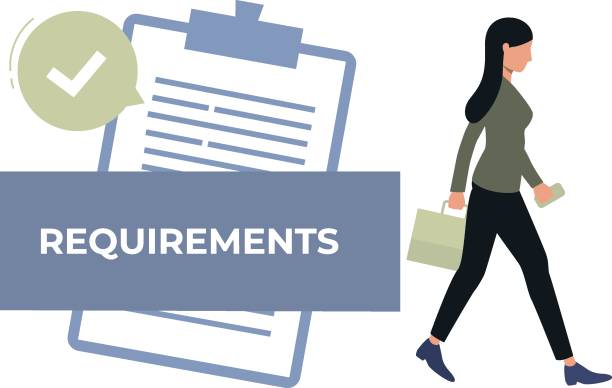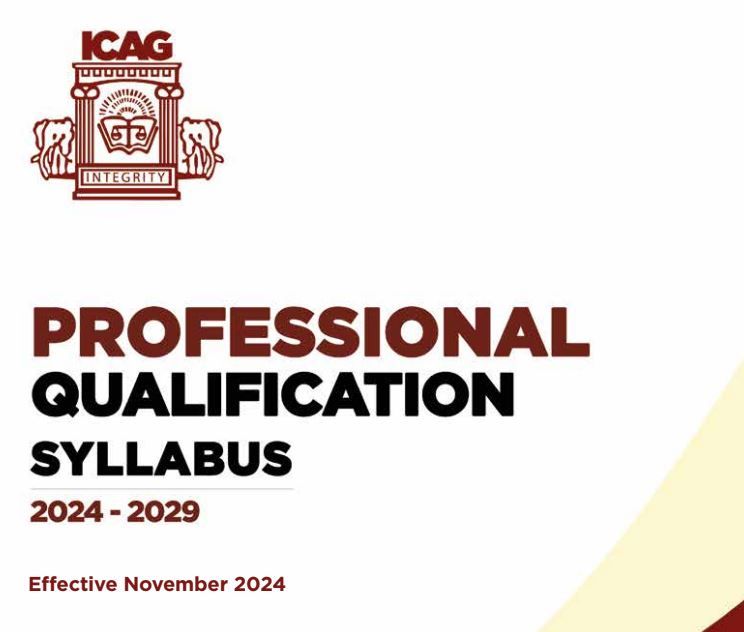The Institute of Chartered Accountants Ghana (ICAG) has rolled out its updated professional qualification syllabus for 2024-2029, marking a pivotal shift in how aspiring accountants prepare for their careers. This framework isn’t just a list of topics—it’s a roadmap that blends technical prowess with real-world application, ethics, and emerging trends like sustainability and technology. Whether you’re a fresh high school graduate or a seasoned professional eyeing exemptions, this syllabus sets the stage for building competencies that align with global standards while addressing Ghana’s unique economic landscape.
Understanding the Structure of the ICAG Professional Qualification

At its core, the ICAG professional qualification is built on a three-tier system: Knowledge, Application, and Professional levels. This progressive structure ensures candidates start with basics and gradually tackle complex scenarios. Altogether, there are 14 papers spread across these levels—four in Knowledge, six in Application, and four in Professional. It’s designed to foster not only knowledge but also skills like critical thinking and ethical decision-making.
The syllabus draws from international benchmarks set by the International Federation of Accountants (IFAC), yet it’s tailored to Ghana’s needs, incorporating local regulations and public sector nuances. Ethics weaves through every level, emphasizing professional skepticism and social responsibility. Plus, with a mandatory practical work experience component, candidates don’t just learn theory—they apply it in workplaces, bridging the gap between classroom and boardroom.
Transitioning smoothly, let’s break down what each level entails. The Knowledge level acts as the foundation, where tasks are straightforward. As you move to Application, things get more hands-on with realistic data sets. By Professional, you’re dealing with high-stakes judgments, advising on intricate issues.
Entry Requirements and Exemptions for the Professional Qualification

Getting started with the ICAG professional qualification isn’t overly daunting, but it does require meeting certain thresholds. For starters, Senior High School leavers with WASSCE need at least six credits, including English and Mathematics. Those with SSSCE or GBCE should have six passes from A to D in similar subjects. If you’ve got tertiary credentials, even better—diplomas, HNDs, degrees, or masters from accredited institutions can fast-track your journey.
Exemptions are a game-changer here. For instance, ATSWA holders skip all Knowledge level papers plus Audit and Assurance and Principles of Taxation from Application. A bachelor’s in accounting? You’re exempt from the entire Knowledge level and select Application papers. Masters graduates with an accounting focus might bypass most of Levels 1 and 2, except Public Sector Accounting and Finance. However, no one gets a free pass on the Professional level— that’s where true expertise is tested.
These rules ensure fairness while recognizing prior learning. If you’re unsure about your eligibility, ICAG’s guidelines make it clear: exemptions are granted on a subject-by-subject basis for non-accounting degrees. This flexibility encourages a diverse pool of candidates, from recent grads to career switchers.
Examination Format and Progression in the ICAG Professional Qualification

Exams under this syllabus are rigorous but fair, with a pass mark of 50% across the board. Each paper scores out of 100, and formats evolve with the levels. Knowledge papers lean on multiple-choice questions or objective testing, perfect for building confidence. Application and Professional shift to more analytical tasks, often involving computations, explanations, and evaluations.
A big update? The phased rollout of Computer-Based Exams (CBE) starting in 2025. Knowledge level kicks it off with MCQs, while higher levels follow suit gradually. This move addresses modern needs, like quicker results and adaptability, though it means students must get comfy with digital interfaces early.
Progression keeps things orderly—you must clear or get credited for all papers in one level before advancing. No cherry-picking required within a level, but exemptions can speed things up. And ethics? It’s baked in, not a standalone test, ensuring it’s part of every assessment.
Overall, this format balances challenge with accessibility. Candidates often find that consistent practice turns potential hurdles into stepping stones.
Diving into the Knowledge Level Papers

The Knowledge level serves as the bedrock, introducing core concepts through four papers. Here, the focus is on grasping fundamentals with structured data, setting a solid base for what’s ahead.
Financial Accounting: Building the Basics
This paper aims to instill a strong grasp of financial accounting principles, from double-entry bookkeeping to preparing basic statements. Learning outcomes include explaining qualitative characteristics of financial info, recording transactions accurately, and drafting statements for entities like sole traders or partnerships.
Key topics cover the regulatory framework, trial balances, error corrections, and reconciliations. You’ll delve into accruals, prepayments, depreciation, and inventory valuation. Why does this matter? In Ghana’s growing economy, accurate financial recording prevents mishaps and supports informed decisions. Candidates learn to handle incomplete records too, a common real-world snag.
Expanding on that, imagine a small business in Accra juggling sales ledgers— this paper equips you to straighten them out efficiently. With weightings around 20-30% on statement preparation, it’s crucial to practice calculations alongside theory.
Business Management and Information Systems: The Operational Backbone
Shifting gears, this paper explores how businesses operate and leverage info systems. Aims center on understanding organizational structures, management functions, and IT’s role in accounting.
Outcomes? You’ll identify business strategies, explain info system components, and assess risks like cybersecurity threats. Topics include planning, organizing, leading, and controlling, plus databases, networks, and data analytics basics.
In today’s tech-driven world, accountants can’t ignore this. For Ghanaian firms adopting digital tools, knowing how systems integrate with financial processes is key. The syllabus highlights emerging tech like AI, preparing you for automation’s impact.
Business and Corporate Law: Navigating Legal Waters
Law might seem dry, but this paper makes it relevant by covering legal frameworks for businesses. The aim is to build knowledge of contracts, company formation, and governance.
Learning outcomes involve describing legal obligations, interpreting statutes, and applying principles to scenarios. Main areas: contract law, agency, partnerships, company incorporation, directors’ duties, and insolvency.
Ghana’s corporate scene, with its mix of local and international firms, demands this awareness. Think of it as armor against legal pitfalls—knowing when a contract is binding can save fortunes.
Introduction to Cost & Management Accounting: Efficiency Essentials
Rounding out the level, this paper introduces costing techniques and decision-making tools. Aims focus on understanding cost behaviors and basic budgeting.
Outcomes include classifying costs, calculating product costs, and preparing simple budgets. Topics: material/labor/overhead costing, absorption vs. marginal costing, variance analysis, and break-even points.
It’s practical stuff—helping managers control costs in competitive markets. For Ghana’s manufacturing sector, mastering this means better pricing and profitability.
Exploring the Application Level in the Professional Qualification

Once Knowledge is under your belt, Application level ramps up with six papers. Here, you apply concepts to realistic, complex scenarios, honing technical skills.
Financial Reporting: From Basics to Complexity
Building on Financial Accounting, this paper targets proficiency in IFRS-compliant statements. Aims: Prepare and interpret reports for single entities and groups.
Outcomes: Apply standards to transactions, draft consolidated statements, and analyze performance. Topics: Conceptual framework, revenue recognition, leases, financial instruments, and group accounts.
In practice, this equips you to handle multinational subsidiaries in Ghana, ensuring compliance and transparency.
Management Accounting: Strategic Cost Control
Progressing from intro costing, this emphasizes performance management. Aims: Use accounting info for planning and control.
Outcomes: Prepare forecasts, analyze variances, and recommend improvements. Key areas: Budgeting techniques, standard costing, decision-making models like CVP analysis, and performance metrics.
Businesses thrive on this—think optimizing operations in Ghana’s volatile economy.
Audit and Assurance: Ensuring Integrity
A new entrant, this paper covers auditing principles. Aims: Understand assurance engagements and processes.
Outcomes: Explain audit frameworks, assess risks, and evaluate evidence. Topics: Ethics in auditing, planning, internal controls, substantive procedures, and reporting.
With rising fraud concerns, this is vital for maintaining trust in financial statements.
Financial Management: Funding and Investment Decisions
Drawing from cost accounting, this focuses on finance strategies. Aims: Advise on financing, investments, and risk.
Outcomes: Calculate costs of capital, evaluate projects, manage working capital. Topics: Capital structure, dividend policies, valuation, and forex risk.
For Ghana’s entrepreneurs, it’s about smart capital allocation amid inflation.
Public Sector Accounting and Finance: Government Focus
Unique to Ghana’s context, this paper addresses public finance. Aims: Apply standards to government entities.
Outcomes: Prepare public accounts, understand fiscal policies. Topics: IPSAS, budgeting in public sector, accountability, and value for money.
Essential for roles in ministries or state enterprises.
Principles of Taxation: Compliance and Planning
This introduces tax systems. Aims: Compute liabilities and advise on compliance.
Outcomes: Explain tax principles, calculate income/corporate taxes. Topics: Personal/corporate tax, VAT, capital gains, and international aspects.
In Ghana’s evolving tax landscape, it’s crucial for minimizing liabilities legally.
Mastering the Professional Level Papers

The pinnacle, Professional level has four papers, demanding advanced judgment in challenging scenarios.
Corporate Reporting: Advanced Financial Insights
Advancing from reporting, this involves complex group accounts and interpretations. Aims: Produce integrated reports, evaluate impacts.
Outcomes: Handle business combinations, fair values, and sustainability reporting. Topics: IFRS advanced, ethics in reporting, and analysis.
Critical for C-suite roles.
Advanced Audit and Assurance: High-Level Scrutiny
Building on audit, this covers specialized engagements. Aims: Lead audits, address ethical dilemmas.
Outcomes: Evaluate risks in complex environments, report findings. Topics: Forensic auditing, due diligence, and assurance on non-financial info.
Prepares for regulatory oversight.
Advanced Taxation: Strategic Tax Advice
From principles, this delves into planning. Aims: Advise on tax strategies, handle disputes.
Outcomes: Optimize tax positions, deal with international tax. Topics: Tax planning, anti-avoidance, and estate taxes.
Ideal for consulting in Ghana’s global trade.
Strategic Case Study: Integrating Everything
This capstone synthesizes knowledge. Aims: Analyze cases, recommend strategies.
Outcomes: Evaluate options, communicate professionally. Topics: Strategy formulation, risk management, using pre-seen info.
It’s where theory meets practice, often with unseen twists.
Key Innovations in the 2024-2029 Syllabus

This iteration stands out with deeper integration of sustainability—think ESG factors in financial decisions. Technology gets a spotlight too, covering data analytics and cybersecurity, reflecting automation’s rise. Ethics isn’t sidelined; it’s embedded, promoting skepticism.
The CBE shift modernizes testing, while annual updates keep content fresh. These changes make the qualification more relevant, preparing accountants for climate challenges and digital disruptions.
Practical Work Experience and Ongoing Development

Beyond exams, you need 450 days of supervised experience, covering accounting, audit, and more. It’s hands-on, with increasing responsibility. Post-qualification, professional development ensures lifelong learning—workshops, CPDs, and more.
This holistic approach turns qualifiers into well-rounded pros.
Tips for Excelling in Your ICAG Professional Qualification Journey

Stay organized—map out study schedules around levels. Practice past papers relentlessly; they reveal patterns. For tough spots like taxation, seek expert guidance. And remember, proven strategies to pass ICAG exams can make all the difference, offering tested methods to tackle challenges head-on.
Balance study with work experience; it reinforces learning. Join study groups for diverse insights.
Leveraging Resources from Knowsia for Success

Platforms like knowsia elevate your prep, providing AI-powered tools, question banks, and expert content. At knowsia, you learn smarter with flexible access to ICAG-specific resources, from past questions to mock exams. It’s not just about passing—it’s empowering your career, perhaps even teaching others on the platform to earn while you grow.
In wrapping up, this syllabus isn’t static; it’s a dynamic tool for aspiring accountants. Dive in, stay committed, and you’ll emerge ready to shape Ghana’s financial future.

